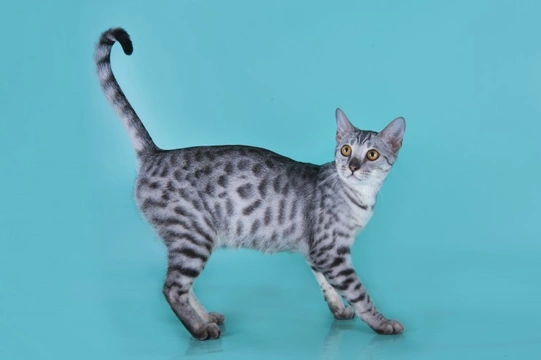
The desirable and expensive Savannah cat
If you browse the cats for sale section here on Pets4Homes and come across the Savannah breed, you will probably notice that these cats commonly change hands for several thousands of pounds, significantly more than all but the highest quality show winners of other pedigree breeds.
While the Savannah cat is undeniably incredibly attractive to look at and rather exotic, you may be wondering exactly why these cats are so expensive; plus what it means when sellers refer to their cats as being “F2” or “F5” or any other “F” and number combination.
If all things Savannah cat are new to you and you are intrigued about this unusual breed, read on to get the answers to all of your Savannah cat questions.
What is a Savannah cat?
It may come as a surprise to learn that the Savannah cat is a hybrid breed, composed of the crossing of a domestic cat (usually a Siamese cat) and a wild African cat, the Serval. While all domestic cat breeds originated with African wild cats, the vast majority of them are many hundreds of years removed from their wild ancestors, making the Savannah cat both highly unusual and rare.
The Savannah is tall and relatively lean, carrying most of their weight in their height rather than their build. They are the largest breed of domestic cat, weighing on average between 20 and 30lb.
The Savannah cat also has distinctive markings that make them similar in appearance to their wild ancestors, as well as retaining traits of the domestic breed that was used to create the line. They are rather wild and exotic looking in appearance, although later generation Savannah cats that are further removed from their wild heritage will tend to look rather more domestic than early generation crossings.
The Savannah cat is a very social creature, and can be trained to walk on a lead, play fetch, and even sometimes perform tricks! They are very active, fit cats that require a lot of room to roam and stimulation.
Why are Savannah cats so expensive?
Understandably, breeding a domestic cat with a wild cat is not a procedure that is within the reach of most of us to achieve, and the Serval cat that forms the foundation of the wild side of the breed cannot be found living wild in the UK! The first Savannah cats were bred in the USA and Canada, where small to medium sized wild cats can occasionally be kept under licence as domestic pets in certain situations.
The rarity of the breed, (particularly within the UK where all of the first early generation Savannah cats were imported rather than bred) combined with the significant demand from potential owners leads to the high price that normally accompanies the Savannah cat, with the earlier generation crossings (those most closely related to the wild Serval) being the most costly to buy.
What do the “F” numbers mean when referring to Savannah cats?
Savannah cats for sale are almost always described with the letter “F” and an accompanying number designation. This “F” number is known as a filial number, and indicates how far removed from the Serval side of their ancestry the Savannah cat is.
- F1 Savannah cats are cats that have a Serval as one parent and a domestic cat as the other, leading to them being 50% Serval and 50% domestic. These are the rarest Savannah cats, and the hardest to breed in the first instance.
- F2 Savannah cats are second-generation crossings, which have one Serval grandparent with three domestic cat grandparents.
- F3 Savannah cats are third generation crossings, with one Serval great-grandparent.
- The subsequent “F” numbers follow the same pattern, and the higher the F number, the further removed from the Serval ancestor the subsequent cat will be.
Is it legal to own a Savannah cat?
Different countries have different laws regarding the ownership of Savannah cats within private homes, and these often vary depending upon how far removed from the Serval side of the ancestry the cat in question is. Within the UK, it is not legal to own a Serval or a first generation (F1) Savannah cat, being a cat that is half Serval and half domestic, without a special licence that the average cat owner will be unable to attain.
However, F2 and subsequent generations are legal to own within the UK, meaning that any cat that has one Serval grandparent with three domestic grandparents is legal to own. You should never buy, or be able to buy, an F1 Savannah cat within the UK on the open market.
Do Savannah cats make good pets?
The Savannah cat is certainly a challenge to keep, requiring lots of living space, room to roam, and plenty of exercise and attention. The RSPCA has expressed some concern about the affect that the Savannah cat may have on the natural wildlife of the UK due to the cat’s keen hunting instincts, and also that ill-prepared owners may find that they have bitten off more than they can chew when buying their first Savannah cat.
A significant amount of research and consideration is required by the potential Savannah cat owner, as well as deep pockets, and the decision to buy a Savannah cat or kitten should not be undertaken lightly. However, for the well-informed and responsible cat owner, the Savannah cat can make an amazing companion and undeniably appealing pet. Have a look at our Savannah cats for sale pages to find available cats for sale.



